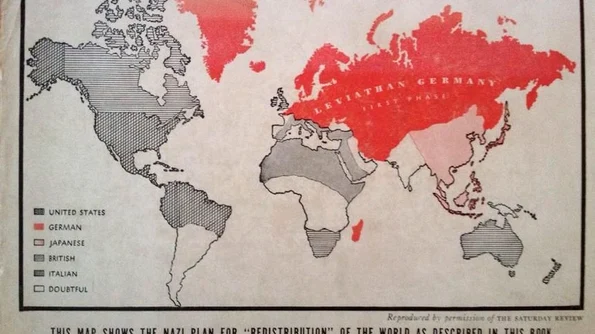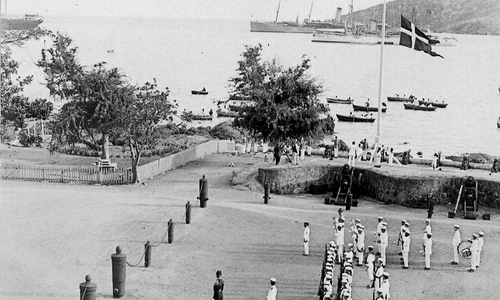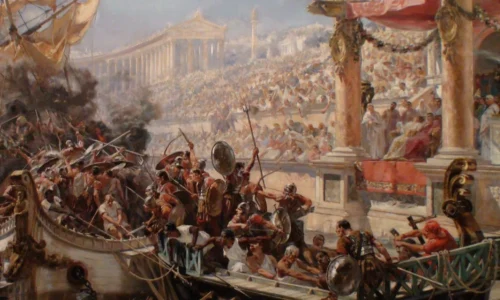
The Outbreak of the Second World War
Usually, people think that the German political elite and Hitler himself wanted to be involved in the type of war that started on September 3rd, 1939 when both the UK and France declared war on Berlin. However, that was not the case. Germany was not militarily or economically prepared to deal with both Paris and London at the same time and more so, it was in relative terms more powerful than them. When and not if the US would come to their aid, the balance would definitely tilt in the West’s favour and not the Third Reich’s.
Hitler wished to involve the Wehrmacht in a series of short wars which would ensure that its fighting capacity would be kept intact by conquering territories which could provide for the army’s needs. Therefore, he thought that extending his Nazi empire step by step in Europe would be the best approach and maybe indeed it was, yet the moment the UK decided to be involved certainly ruined these carefully thought plans.
When Ambassador Henderson brought the news to the Reich Chancellery that London would not stand idle and watch Germany’s advancement in Poland, Hitler was left speechless. His foreign minister and once ambassador to London, Joachim von Ribbentrop was considered by Hitler a sort of expert in English politics. Ribbentrop was convinced that the UK would not consider entering a continental war. Therefore, he talked Hitler into believing that the British were to be no enemy to the Reich’s plans for creating a European Empire. Yet, when Henderson presented them with the declaration of war, Ian Kershaw writes that Hitler was seemingly lost and asked Ribbentrop “now what?”.

Of course, Ribbentrop was not the person to take on the job of being the Foreign Minister of the Reich, yet, he was not chosen for his diplomatic abilities, but rather for his ability to follow orders. Hitler would decide the most important foreign policy directions and would often conduct it by-passing Ribbentrop. However, Hitler was getting ready to have his wars one way or another and a more sensible person like von Neurath would have probably objected to some of his actions. He ousted from power the people who might have been real obstacles in his way to September 1939 in 1938.
However, regardless of his policy towards the US, Hitler knew that, at some point, it would shift its entire power in the favour of the UK and France which would most definitely mean the end of his envisioned hegemony. Therefore, he asked for the US not to be provoked too early for fear it might ruin his chances to win over the European states.
Thus, he had to create a situation which would lead to his first attack and first of his projected short wars and of course, Poland was the easiest target. Also, the German economy was one of the big pressures to be taken into account when planning for war:1939 was the definitive year where a very important and engaging decision should have been taken – whether the regime would go to war or would pressure the economy into being more oriented towards the people and to cater more to their needs, which were largely forgotten in the last years of peace before the war.
Predictably, the regime chose war. Hitler chose war. Some of his advisers did so too, yet some were convinced that it was not the best time to do so. Even Hitler admitted that the Wehrmacht would be at its full capacity in 1942, yet the Nazi ideology professed an inevitable war of survival and hegemony. The Chancellor felt it was better to launch a war now than later, since he would probably not be around and he was the only leader to be able to take Germany to such imagined heights.
Nevertheless, it was all in his mind. The UK and France were trying (not too hard, it could be said) to get the USSR into a loose alliance to encircle the Reich and to deter it from further aggressions. Yet, Moscow was asking for something which the West was unable or unwilling to put as on offer:territory in Eastern Europe and real guarantees of its own soil. For 2 years, Germany was willing to do just that and here is the reason the Kremlin and Berlin signed the Ribbentrop Molotov Pact. Yet, when Hitler found it run its use, the pact was no longer valid and he decided to attack the USSR which happened on June 22nd, 1941.

Also, during the Danzig Crisis, Berlin tried and thought it finally managed to separate the common security Warsaw and London decided upon. Yet, on August 25th1939, the UK signed its mutual assistance treaty, the Reich found it impossible to hope for a treaty with them, but rather, to persuade London not to enter the war against Germany, until it finished its attack on Poland and continued its plan to annex the whole Continent. In return, Berlin would guarantee the British Empire. So, a free hand in Europe for a guarantee of the whole Empire? Too costly is what London thought and it went on to stop trying to talk Germany out of attacking various countries in Europe. This was also the effect of the improved relation with the US which seemed to worsen the Berlin – London connection. In the end, it seems that, with Washington in the picture, London had to choose between a good relation with the US and trying to appease the Reich more. When it was obvious that Germany had to immediate plans to stop and discuss whatever it was doing, the UK chose the American connection hoping it would be of help. And it most definitely was, but not in 1939 – 1940 when the British fled the Normandy shores.

All in all, it could be said that the war started in Hitler’s mind even before he was Chancellor and he only brought it to a state policy upon becoming the leader of Germany. Yet, he felt encouraged by the British appeasement policy, USSR’s isolation, France’s lack of power in the International Relations and the American neutrality. At the time, it seemed he would enjoy a swift victory and his European hinterland would be easily created. Two years later, the USSR and the US became the Reich’s main enemies which effectively destroyed Berlin’s plans of short wars. In 1942, Hitler understood that he lost the war.
So, I guess, the question we all think of is why did he went on with it?















